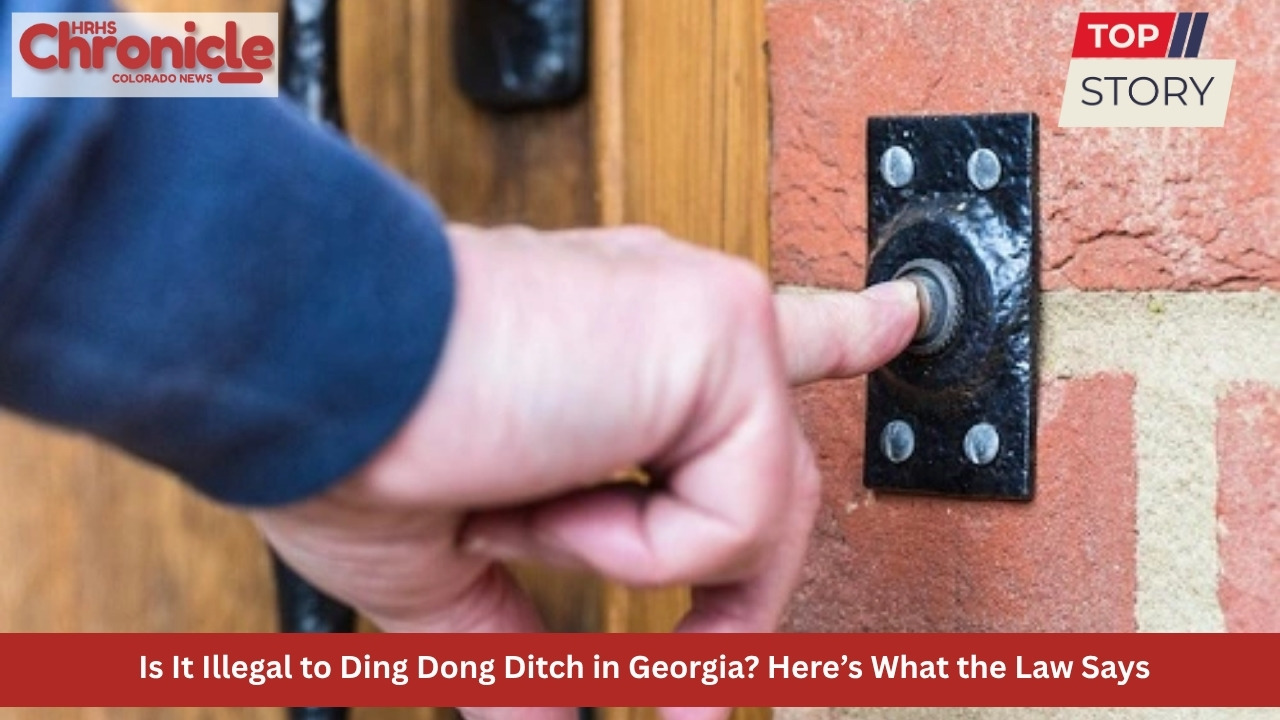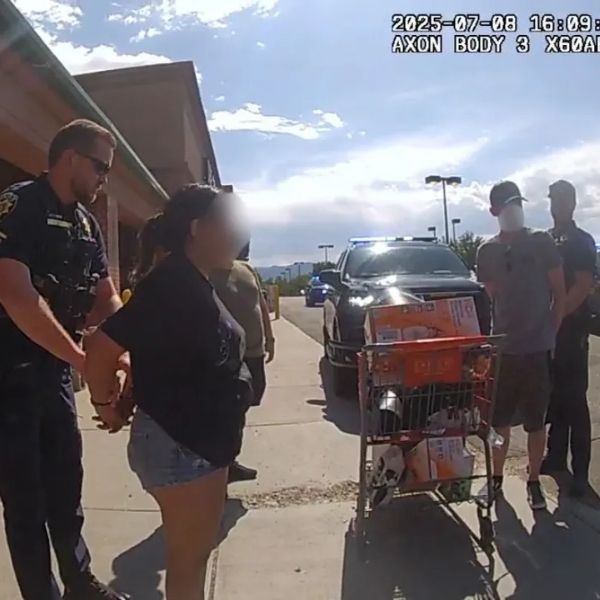Georgia – Ding dong ditch, sometimes called knock-knock-ginger, is a prank where someone rings a doorbell or knocks and runs away before the homeowner answers. While it’s often seen as harmless mischief among kids and teenagers, this prank can have more serious implications—especially if repeated or carried out at odd hours.
The Legal Grey Area in Georgia
Georgia does not have a specific law named after ding dong ditch. However, this prank can cross boundaries into other legal categories. It’s important to remember that what might seem like innocent fun can, under the wrong circumstances, become a criminal or civil matter, depending largely on the situation and intent.
In cities like Atlanta, Macon, Augusta, and Savannah, residents have reported instances of ding dong ditch—sometimes triggering a visit from law enforcement. The key factor that determines legality is whether the act causes fear, alarm, property damage, or persistent disturbance.
Possible Charges for Ding Dong Ditch in Georgia
In Georgia, the following charges could potentially apply:
-
Disorderly Conduct: If the prank causes a disturbance and upsets the peace of a neighborhood, it can be classified as disorderly conduct. This is especially likely if it’s repeated, late at night, or causes fear.
-
Criminal Trespass: Entering someone’s property without permission, even just a front porch or driveway, can sometimes be prosecuted as criminal trespass.
-
Harassment or Stalking: Persistent targeting of a specific household, especially with intent to threaten or scare, can lead to more serious charges, such as harassment.
-
Endangering Minors: If young children are left unsupervised while playing pranks, parents could be held responsible for their children’s behavior.
Incidents and Law Enforcement Response
Cities such as Valdosta, Columbus, and Athens have all seen incidents where ding dong ditch pranks escalated. In Tybee Island, for example, a group of teenagers were prosecuted after repeatedly pranking a resident. A man named William Raymond Cole was arrested for a violent confrontation following a ding dong ditch incident; the situation spiraled beyond a prank, leading to charges of aggravated assault and cruelty to children.
Police responses vary. Many officers will offer stern warnings, especially if young people are involved and no harm has been done. However, repeated pranks or ones that escalate into altercations can result in arrests and court appearances.
Civil Ramifications
Even without criminal charges, homeowners in cities like Roswell or Albany could pursue civil action against repeat pranksters if the prank caused alarm, property damage, or emotional distress. Nuisance laws and trespassing statutes may apply, and parents of minors can be held financially liable for damages.
Why Pranks Like Ding Dong Ditch Can Become Dangerous
While many play this game in good spirit, the aftermath is unpredictable. In more than one Georgia city, startled homeowners have responded with aggression or even violence when surprised at their doors, not knowing if it’s a prank or a potential threat. Instances from cities across the United States, including Georgia, have sadly led to assaults and even fatal encounters.
A notable incident in Tybee Island highlighted these dangers: after a group of teens played ding dong ditch, the homeowner responded violently, resulting in charges and a high-profile arrest. Savannah police have reported similar conflicts, where what started as a prank ended up with people in the hospital or facing serious legal consequences.
What Georgia Law Enforcement and Schools Advise
Law enforcement agencies across the state, including those in Atlanta and Athens-Clarke County, warn parents and students about the risks tied to such pranks. Schools in Augusta have even sent letters home to warn about the dangers and urge students to avoid participating in ding dong ditch. They stress respect, empathy, and awareness about how one’s actions might frighten or anger others.
Community-Based Alternatives
Many Georgia communities have neighborhood watches and frequently use doorbell cameras, making it much easier for pranksters to be caught. Smart devices in places like Sandy Springs or Marietta allow homeowners to identify visitors instantly, which has led to many pranksters being recognized and reported.
As more cities adopt these technologies, it’s not just about getting away unseen—the digital footprint is often left behind. In some cases, video evidence provided by residents has been used in investigations and, in rare cases, prosecutions.
Consequences for Minors
If caught, minors are often given warnings but can be required to attend court, especially if the prank led to injury or property damage. In repeat cases, Georgia judges have ordered community service or required counseling for young offenders in cities like Rome or Warner Robins.
A misdemeanor conviction for criminal trespass or disorderly conduct can stay on a juvenile record and impact opportunities, such as school programs, scholarships, or college applications.
Advice for Parents and Teens
Parents in Georgia should talk to their children about the risks and potential consequences of participating in ding dong ditch or similar activities:
-
Discuss the laws in your city and what constitutes trespassing or disorderly conduct.
-
Emphasize the importance of respecting neighbors’ privacy and property.
-
Encourage alternative ways to have fun that don’t involve scaring or disrupting others.
A Closer Look at Georgia’s Approach
Georgia communities tend to take ding dong ditch seriously when public safety is at risk. For instance, Savannah officers have intervened when prank calls or bell-ringing escalated into conflicts. Law firms in Atlanta note that the law typically weighs intent and harm: a one-time, innocent prank may get a warning, but targeted harassment or late-night incidents are much more likely to result in charges.
Across Georgia, statistics show a decrease in these types of pranks since the widespread use of door cameras and increased neighborhood vigilance. However, every year, reports spike around Halloween and during school breaks.
Real-Life Stories from Georgia Cities
- In Athens, a group of teens was caught on video repeatedly ringing neighbors’ doorbells. The families met with a community mediator, and the situation was resolved peacefully—but only after involvement from the police and local leaders.
-
In Buckhead, Atlanta, a ding dong ditch escalated into a shouting match and police intervention, with both sides filing complaints.
-
In Augusta, a resident was fined for trespassing after repeatedly ringing a neighbor’s door, despite warnings.
What Homeowners Can Do
If you’re a homeowner in Georgia dealing with persistent pranks, consider the following:
-
Install a video doorbell or security system.
-
Contact local authorities if you feel threatened or if the pranks continue.
-
Keep records or video footage, which can assist police.
However, homeowners are also warned not to take the law into their own hands. Defensive actions that cross into violence or intimidation can result in criminal charges for the homeowner.
Conclusion
Ding dong ditch in Georgia usually starts as a prank, but it can quickly become illegal if it disturbs peace, involves trespassing, or creates fear or harm. Each city—from Atlanta to Valdosta—may respond differently, but the trend is clear: Georgia law doesn’t explicitly ban ding dong ditch, but the behaviors associated with the prank can still break the law.
In today’s world of video doorbells and heightened awareness, what might once have been shrugged off as childish fun now has real legal and social consequences. To stay safe and on the right side of the law in cities across Georgia, it’s best to skip the doorbell pranks and find other, safer ways to have fun.

Mrs. Odice has been a teacher here for 9 years. She likes yoga and spends most of her time with her 3 kids. She also grew up going to Douglas County schools and is Canadian.















Leave a Reply